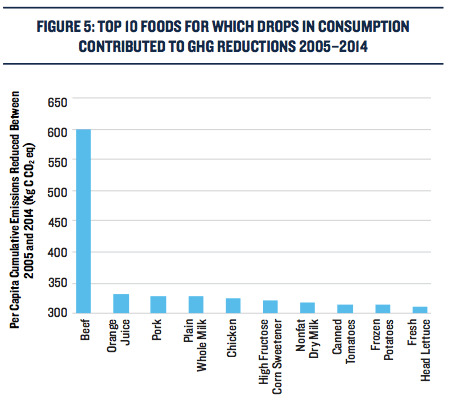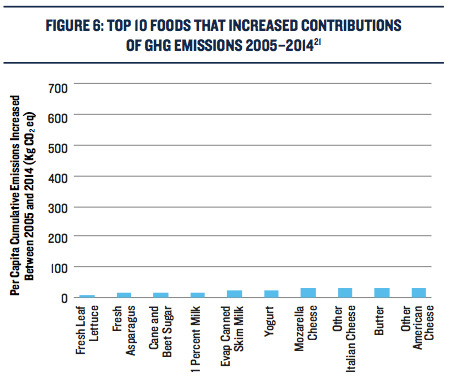Americans Are Eating Less Beef, And The Climate Is Benefiting From It
Americans are eating less beef, and the results of that are positive: the average American diet's carbon footprint has shrunk by 9-percent, reducing the amount of greenhouse gases released into the environment. Such is the conclusion of a new analysis that found a significant decrease from 2005 to 2014. Multiple dietary changes in America are cited as the cause of the emissions decrease, with reduction in beef consumption being chief among them.
The information comes from the Natural Resources Defense Council (NRDC), which starts its report with a dramatic –and rather stunning — announcement: Americans reduced their beef consumption adequately enough to eliminate emissions equal to what 39 million cars would have pumped into the environment. This represents a per-capita dietary decrease of 10-percent.
Overall, the NRDC says that multiple dietary changes helped avoid 271 million metric tons of pollution being generated and released into the environment. When factoring in all the harmful food reductions, Americans reduced emissions by the equivalent of 57 million vehicles.

Though reduction in beef consumption is said to be the most impactful change, the NRDC also says that Americans ate less milk, shellfish, pork, and high-fructose corn syrup, helping cut emissions. With those decreases, though, came some increases in consumption of butter, cheese, and yogurt.
It has long been known that cattle are high contributors to greenhouse emissions due to their large methane production. That is coupled with the emissions that result from sustaining cattle, including from raising feed like soy and corn. For this reason, dairy products also tend to have a high carbon footprint, and ideally people will start eating less of them.

Though beef consumption has decreased, the NRDC cautions that Americans are still eating more of it than almost every other nation on Earth, being eclipsed only by the consumption rates in Uruguay and Argentina. Oddly enough, the study also found that Americans increased the amount of asparagus they ate during the aforementioned time period, something that is unfortunate due to the vegetable's high carbon footprint.
Overall, Americans greatly reduced their harmful dietary habits from 2005 to 2014, eclipsing the increase in harmful food consumption. The NRDC says that positive changes involved reduction in not just beef, but also orange juice, pork, plain white whole milk, chicken, high-fructose corn syrup, non-fat dry milk, canned tomatoes, frozen potatoes, and fresh head lettuce.
SOURCE: NRDC
Graph images via NRDC
